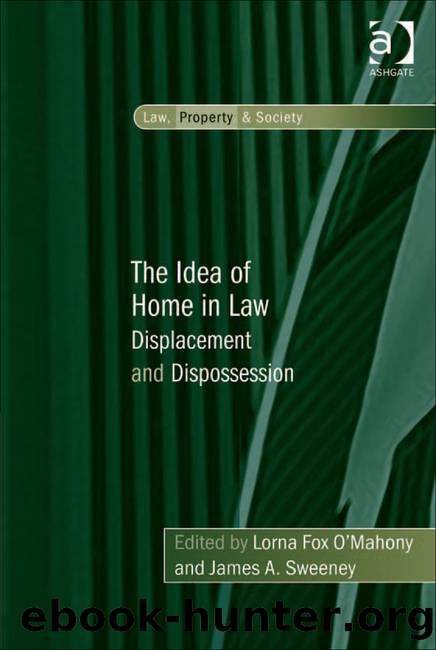The Idea of Home in Law by O & #39;Mahony Lorna Fox Sweeney James A. & James A. Sweeney

Author:O & #39;Mahony, Lorna Fox, Sweeney, James A. & James A. Sweeney
Language: eng
Format: epub
Publisher: Ashgate Publishing Ltd
Published: 2011-09-14T16:00:00+00:00
(7) Case Study 2: Late-applying Asylum Seekers
In 2002 primary legislation was passed that attempted to exclude late-applying asylum seekers from NASS accommodation and support. Section 55(1) of the Nationality, Immigration and Asylum Act 2002 (NIAA) places the Home Secretary under a duty to exclude asylum seekers who do not make their application for asylum ‘as soon as reasonably practicable’. However, a ‘safety net’ under section 55(5) NIAA 2002 does ‘not prevent’ the Home Secretary exercising a power to support late-applying asylum seekers to the extent necessary for the purpose of avoiding a breach of the European Convention on Human Rights, so preventing the Act from requiring the Home Secretary to act in such a way as to conflict with section 6(1) of the Human Rights Act (HRA) 1998.67 Yet, in what appears to be a spirit of minimal compliance, the Home Secretary has seemed at times reluctant to exercise this power, even in the face of considerable hardship.
An example of the judiciary forcing the use of the safety net can be seen in the case of Adam, Limbuela and Tesema,68 where each applicant had been excluded from access to support by virtue of section 55(1), and the power under section 55(5) had not been exercised by the Home Secretary. The facts presented to the House of Lords indicated that the applicants had each experienced real hardship, including sleeping rough, and the House of Lords went on to hold that the Home Secretary’s failure to exercise the power under section 55(5) NIAA 2002 amounted to a violation of their right to freedom from inhuman and degrading treatment under Article 3 ECHR. The House of Lords found that because the statutory framework combined the exclusion from support and accommodation with a prohibition on work, it was a positive act by the state against asylum seekers.69 It was therefore caught by Article 3’s prohibition upon inflicting inhuman and degrading treatment, rather than a positive obligation to protect the applicants from experiencing inhuman and degrading conditions.
It is significant to note that this case was adjudicated on the basis of Article 3 ECHR, which at one level provides a welcome recognition that homelessness and destitution strike at the heart of what it means to be human: that they can constitute inhuman and degrading treatment. However, it might seem counterintuitive to base any ‘home’ rights available to asylum seekers on Article 3 rather than the right to respect for home, family and private life in Article 8 ECHR. As well as reserving protection only to those cases with the most extreme adverse facts, as the discussion below will demonstrate, this can also be viewed as an acknowledgement of the particularly contingent nature of the right to respect for home under Article 8 ECHR as well as the right to adequate housing in the International Convention on Economic, Social and Cultural Rights.
Download
This site does not store any files on its server. We only index and link to content provided by other sites. Please contact the content providers to delete copyright contents if any and email us, we'll remove relevant links or contents immediately.
Killers of the Flower Moon by David Grann(3234)
Machine Learning at Scale with H2O by Gregory Keys | David Whiting(2283)
Will by Will Smith(2040)
Guns, Germs and Steel by Diamond Jared(1881)
Borders by unknow(1785)
The Room Where It Happened by John Bolton;(1719)
The Color of Law by Richard Rothstein(1574)
Once Upon a Broken Heart by Stephanie Garber(1480)
Water Rights and the Environment in the United States by John Burch(1414)
Friends, Lovers, and the Big Terrible Thing by Matthew Perry(1326)
Examples & Explanations: Administrative Law by William F. Funk & Richard H. Seamon(1325)
A Short History of War by Jeremy Black(1299)
Pharmacy Practice and The Law by Richard Abood(1253)
HBR's 10 Must Reads 2022 by Harvard Business Review(1253)
The Strength In Our Scars by Bianca Sparacino(1240)
That Every Man Be Armed by Stephen P. Halbrook(1236)
The Guarded Gate by Daniel Okrent(1219)
515945210 by Unknown(1206)
Injustices by Ian Millhiser(1198)
